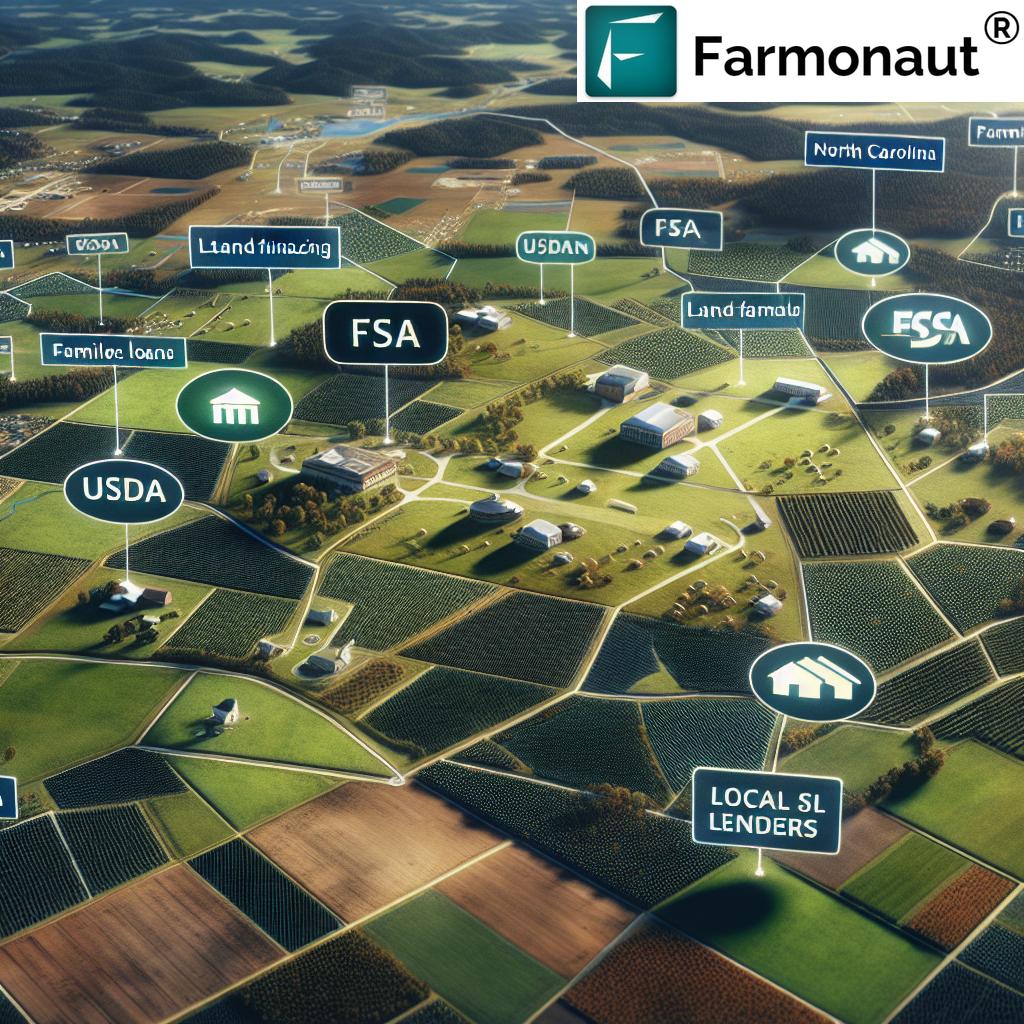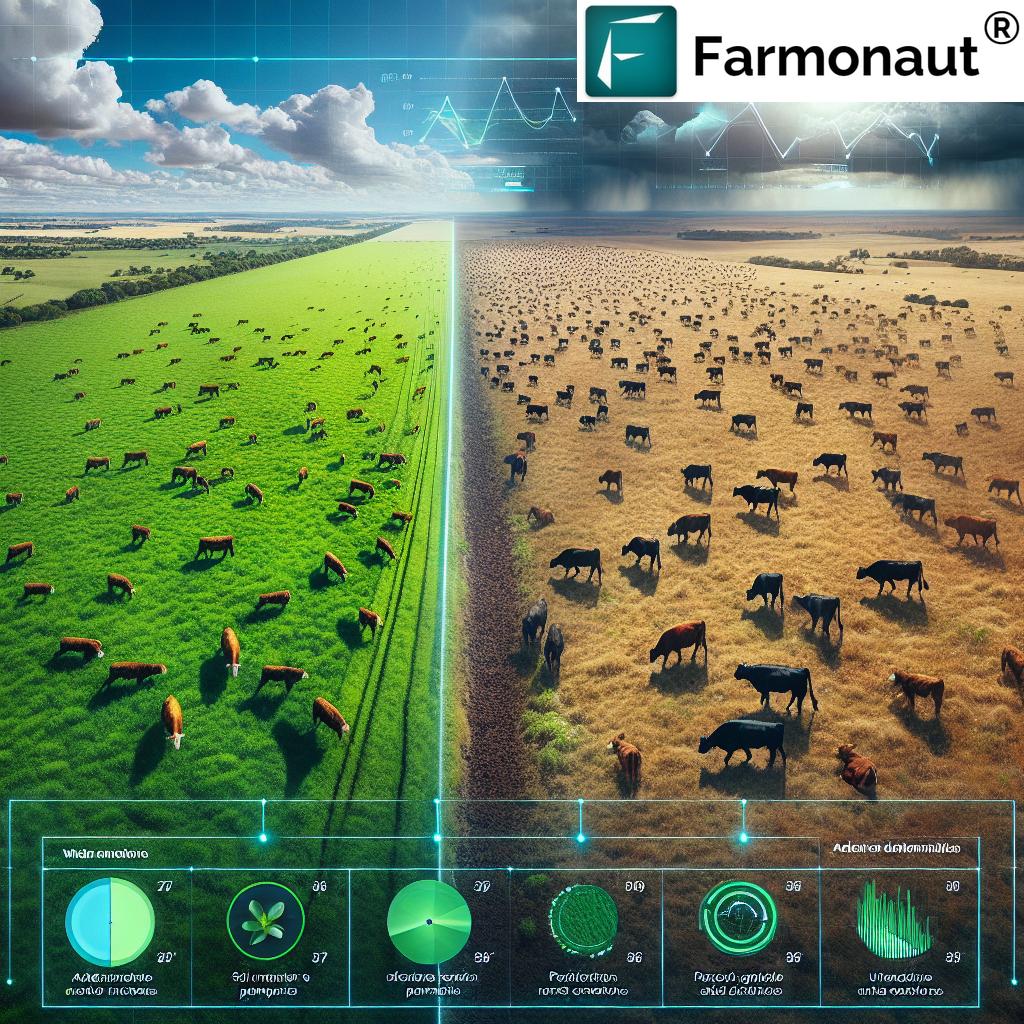Farm Credit Loans for Land: 7 NC Financing Options
“Over 60% of North Carolina farmland purchases in 2023 used specialized farm credit loans for financing.”
- Introduction: Loans for Farm Land and Agricultural Expansion
- Understanding Farm Credit Loans
- Key Providers of Farm Credit Loans in North Carolina
- Types of Farm Credit Loans for Land Acquisition
- Eligibility Criteria for Agricultural Land Loans
- Farm Loan Application Process: Step-by-Step
- Comparison Table of Farm Credit Loan Options
- How Farmonaut Supports Better Land Financing
- Considerations When Applying for Land Loans
- FAQ: Farm Credit Loans for Land in North Carolina
- Conclusion: Farm Credit Loans & Agricultural Sustainability
Introduction: Loans for Farm Land and Agricultural Expansion
Acquiring land is a crucial milestone for any agricultural business. Whether you’re establishing a new farm, expanding operations, or transitioning to more sustainable practices, access to affordable financing options shapes your long-term success. North Carolina, with its vibrant ecosystem of family farms, agribusinesses, and rural communities, offers an impressive spectrum of farm credit loans and agricultural land loans. These financial instruments not only empower farmers and ranchers to purchase land but also support the growth and sustainability of agricultural enterprises.
This guide offers a comprehensive overview of the 7 primary financing options available in NC, focusing on:
- Understanding farm credit loans—what they are, how they work, and why they’re essential
- Detailed profiles of key lenders and programs such as FCS, FSA, and NCAFA
- Insights on eligibility criteria, interest rates, and down payment requirements
- Step-by-step directions for the farm loan application process
- Tips on maximizing the benefits of rural land financing for sustainable farm ownership
Throughout, we’ll reference North Carolina-focused programs and examples, making this blog an ideal resource for local farmers, agricultural entrepreneurs, and anyone curious about the evolving landscape of agricultural financing options.
“There are 7 distinct agricultural land loan options available to North Carolina farmers seeking business expansion.”
Understanding Farm Credit Loans: Specialized Financial Instruments for the Agricultural Sector
Farm credit loans are financial products specifically tailored to the agricultural sector’s unique needs. Unlike conventional business or personal loans, these instruments are designed around the cycles, risks, and long-term nature of farming and rural land acquisition. Key features include:
- Lower interest rates (compared to commercial loans) due to government support and lender specialization
- Extended repayment periods (sometimes up to 40 years), matching the slow payback cycle typical for farm land investments
- Flexible collateral requirements—many programs accept real estate, equipment, and even projected crop revenue as security
- Specialized loan products for land purchase, farm ownership, equipment, infrastructure, and working capital
These instruments may be offered by government-sponsored enterprises (GSEs) such as the Farm Credit System (FCS), by divisions of the USDA like the Farm Service Agency (FSA), or by state-specific organizations including the North Carolina Agricultural Finance Authority (NCAFA). Additionally, select commercial lenders and rural banks offer competitive options thanks to guarantees and support from the USDA and state agencies.
The overarching aim? To provide farmers, ranchers, and rural residents with favorable loan terms that support sustainable growth of agricultural enterprises.
Key Providers of Farm Credit Loans in North Carolina
Securing the right land loan often depends on choosing an experienced and specialized lender. Here are the primary types of providers servicing North Carolina:
-
Farm Credit System (FCS)
- What is FCS? Established by Congress in 1916, FCS is a nationwide network of borrower-owned lending institutions dedicated to agricultural financing. FCS covers over 45% of the U.S. farm business debt market.
- Products: Land purchase loans, farm ownership loans, operating loans, equipment loans, leases, and related services.
-
Farm Service Agency (FSA)
- What is FSA? A division of the USDA, the FSA manages multiple loan programs to assist farmers, ranchers, and family farm operators (primarily those who may not yet qualify for commercial financing).
- Products: Direct and guaranteed farm ownership loans, microloans, and rural land financing with strong support for beginning and historically underserved farmers.
-
North Carolina Agricultural Finance Authority (NCAFA)
- What is NCAFA? A state-specific authority, NCAFA provides affordable credit options to NC farmers and agribusinesses unable to obtain reasonable rates elsewhere.
- Products: Series I Farm Real Estate Loans for individuals and qualified entities—tailored to local land markets and North Carolina’s agricultural needs.
In addition to these, certain local commercial lenders and rural banks participate in both direct and guaranteed loan programs, often in partnership with the agencies outlined above.
For those seeking to finance land purchases while leveraging advanced agri-technology for ongoing operations, Farmonaut’s satellite-based monitoring and loan verification tools offer a unique advantage for both borrowers and institutions. Discover our advisory platform for optimized crop management.
Types of Farm Credit Loans for Land Acquisition (NC Focus)
North Carolina farmers and agricultural entrepreneurs can choose from seven primary financing options—each designed with different land purchase and business expansion needs in mind. These options provide flexibility for buying farmland, refinancing, making farm improvements, or supporting related agricultural enterprises.
1. Direct Farm Ownership Loans (FSA)
- Borrow up to $600,000 for purchasing farmland, making improvements, or constructing buildings
- Repayment terms up to 40 years
- Low down payments, competitive rates
2. Down Payment Farm Ownership Loans (FSA)
- Special focus on beginning and socially disadvantaged farmers
- Requires just 5% down; FSA can finance no more than 45% of purchase price/appraised value (up to $667,000)
- Balance may be covered by commercial or FCS loans
3. Guaranteed Farm Ownership Loans (FSA)
- Commercial lenders provide up to $2,236,000, with FSA guarantee against default
- Flexible repayment (up to 40 years)
- Ideal for those unable to secure traditional credit
4. Series I Farm Real Estate Loans (NCAFA)
- Available to individuals, partnerships, or corporations in North Carolina
- Competitive rates, repayment up to 20 years
- Designed for borrowers unable to secure local financing on reasonable terms
5. Farm Credit System Land Loans
- Traditional and recreational land loans from FCS-affiliated institutions
- Fixed and variable interest rates, typically 15-30 year terms
6. Commercial Lender Agricultural Land Loans (FSA-Guaranteed)
- Local/commercial banks with FSA backing up to $2,236,000
- Often faster approval processes, but criteria set by local lenders
7. Rural Land Loans: Special Purpose & Timberland
- Designed for ranchers, hunting, timber, or recreational farmland
- Flexible repayment schedules
- Available from FCS, select banks, or state agencies
It’s vital to consult with lenders or loan experts about which product best matches your operational goals and eligibility.
Comparison Table of Farm Credit Loan Options in North Carolina
| Criteria | Direct FSA Farm Ownership Loans | Down Payment FSA Farm Ownership Loans | Guaranteed FSA Farm Loans | NCAFA Series I Farm Real Estate Loans | FCS Land Loans | FSA-Guaranteed Commercial Land Loans | Rural Land & Timberland Loans |
|---|---|---|---|---|---|---|---|
| Estimated Interest Rate (%) | 5.5%–6.5% | 4.5%–6.0% | 6.0%–8.0% | 5.9%–7.5% | 5.75%–7.5% | 6.0%–8.5% | 6.5%–8.0% |
| Maximum Loan Amount (USD) | $600,000 | 45% up to $667,000 (FSA share) | $2,236,000 | Varies; typically up to $500,000+ | $1,500,000+ | $2,236,000 | $500,000+ |
| Minimum Down Payment (%) | 0%–5% | 5% | 10%–30% (lender-based) | 15%–20% | 20%–30% | 10%–30% | 20%–35% |
| Eligibility Requirements | Family farmers & ranchers; U.S. citizens/residents |
Beginning & socially disadvantaged farmers; 5% cash down; no large real estate holdings |
U.S. citizens; Unable to get credit elsewhere |
NC residents/entities; Limited credit access |
Qualified borrowers; Ag purpose |
Applicants approved by both local lender & FSA | For rural/agricultural use; Some lenders may require ag business plan |
| Repayment Terms (Years) | Up to 40 | Up to 40 | Up to 40 | Up to 20 | Up to 30 | Up to 40 | 15–30 |
| Application Processing Time (Days) | 30–90 | 45–90 | 30–90 | 30–60 | 25–60 | 30–60 | 30–60 |
| Unique Benefits or Features | Direct access; tailored to small/medium farmers | Low down payment; great for new entrants | Large loans; good for expansion | NC-specific; flexible if denied elsewhere | Wide land types; business support | Blends commercial speed with govt security | Recreational/timberland; flexible use |
Agricultural Loan Eligibility Criteria: Who Qualifies for Land Loans?
Before launching a farm loan application, it’s vital to confirm your eligibility with each program/lender. General requirements for
- Citizenship/Lawful Residency: Only U.S. citizens and legal resident aliens are eligible.
- Operational Capacity: You must have the legal capacity to contract, borrow, and (where relevant) operate as a family farm.
- Creditworthiness: An acceptable credit history and, sometimes, a minimum credit score.
- Financial Need: For many FSA programs, applicants must show inability to secure reasonable credit elsewhere without a guarantee.
- Management & Experience: Ability to manage day-to-day farm operations is often required—though some programs (e.g., Down Payment loans) cater to beginners.
- Additional Criteria: For NCAFA and some commercial/guaranteed products, demonstration of viable business plan or farming intent may be needed.
Documentation Required:
- Personal ID (driver’s license, passport, etc.)
- Proof of U.S. citizenship or legal residency
- Business plan or intent statement
- Financial statements (income tax returns, balance sheets, income projections)
- Land purchase agreement or offer document
- Credit report (provided or pulled by the lender)
Tip: Many programs strongly support beginning farmers, minorities, and family farm transitions. Contacting your local FSA or farm service office can help clarify specific requirements.
Farm Loan Application Process: Step-by-Step Guide for North Carolina
Navigating the farm loan application process can seem daunting, but breaking it down into clear steps helps streamline your path to land ownership. Here’s how most North Carolina applications (FSA, FCS, NCAFA, and commercial) typically unfold:
-
Preparation
- Gather necessary documents (financials, legal ID, business plan, purchase agreement, etc.)
- Optional: Use Farmonaut’s digital farm monitoring tools to supply land productivity data, satellite maps, or yields (crop verification can strengthen your application).
-
Application Submission
- Complete the lender’s official application (online, via local branch, or FSA field office)
- Attach all required supporting documents
-
Loan Review & Approval
- Lender evaluates your application, checks eligibility, reviews farm plan/experience, and requests additional info if needed
- For FSA-guaranteed programs, both the commercial lender and FSA review your package
-
Land Appraisal & Assessment
- Most loans require a formal appraisal of the land you intend to purchase
- Some may also require environmental assessment (especially for timberland or non-traditional uses)
-
Loan Offer & Acceptance
- Upon approval, you’ll receive a loan offer outlining your eligible amounts, rates, terms, and required down payment
- Thoroughly review offer details before accepting and proceeding to closing
-
Closing & Funding
- Sign all final documents (loan contract, security agreement/mortgage, insurance, etc.)
- Funds are disbursed to allow you to finalize your land purchase
Pro Tips:
- Contact multiple lenders/program offices for rate quotes and assistance
- Consider pre-approval or pre-qualification—especially for competitive rural land markets
- Use agri-technology platforms (like Farmonaut) for digital documentation and demonstrating farm capacity
How Farmonaut Supports Better Land Acquisition, Financing, and Sustainability
As agricultural operations become more data-driven, lenders increasingly value objective insights into farm productivity, risk, and resource efficiency. We at Farmonaut, a pioneering agricultural technology provider, deliver a full suite of satellite-based farm management tools that can:
- Verify Crop Health & Output: Our satellite imagery and multispectral analysis provide hard evidence to support your loan applications, making it easier for you to secure larger loans with more favorable terms.
- AI-Powered Farm Advisory: With Jeevn AI, you receive personalized advice on crop selection, input usage, and weather risks—supporting both everyday management and your long-term business plan for lenders.
- Resource & Fleet Management: Our analytics help you manage your machinery and field operations more efficiently, key for demonstrating sustainable practices to loan underwriters.
- Blockchain Traceability: Farmonaut’s blockchain module ensures full transparency to buyers and certifying bodies, crucial for those seeking organic or sustainable land loans. More about this feature is available on our Product Traceability page.
- API for Lenders: Developers and lenders can access our satellite and weather data via our API (API access | Developer Docs).
- Carbon Footprinting: Track and report your operation’s carbon footprint with us—boosting eligibility for certain green or sustainable loan products. See our platform for details.
- Crop Loan Verification: Farmonaut’s crop loan and insurance solutions help you minimize insurance fraud and get crop verification instantly, speeding up access to funds.
We are committed to making precision agriculture affordable and accessible to farmers worldwide. Explore our advanced farm management apps and large scale field digitization tools to supercharge your land loan journey!
Considerations When Applying for Agricultural Land Loans in North Carolina
-
Down Payment Requirements:
Most rural land loans demand a minimum down payment of 20%–30%. FSA’s Down Payment program is a standout for qualifying beginners, requiring just 5%. This higher-than-home-mortgage rate reflects the risk profile of vacant or agricultural land. -
Farm Loan Interest Rates:
Rates can be fixed or variable, and are typically more favorable than standard commercial options—especially when backed by FSA or NCAFA. Always compare multiple offers and watch for special promotions from state lenders. -
Repayment Periods:
Depending on the lender and product, terms may range from 15-40 years. Longer periods lower your monthly burden, but may result in higher total interest paid. -
Loan Limits and Market Fluctuations:
Maximum loan amounts are set per program and may be indexed to farmland valuations, appraisals, and periodic USDA recalculations. -
Use of Technology:
Incorporating precision ag data (land productivity analytics, digital area measurement, real-time crop monitoring from Farmonaut) can boost lender confidence—potentially lowering perceived risk and securing more favorable terms. -
Business Planning:
A solid, actionable, and tech-enabled farm business plan strengthens your application—especially when paired with satellite data and digital records from Farmonaut. -
Environmental and Resource Compliance:
If purchasing timberland, pasture, or land for organic production, ensure your intended use aligns with local/state environmental regulations.
FAQ: Farm Credit Loans for Land in North Carolina
Conclusion: Farm Credit Loans Fuel Sustainable Growth in NC Agriculture
Farm credit loans are the engine powering land acquisition, business growth, and agricultural sustainability in North Carolina. With seven robust agricultural land loan options from federal, state, and local lenders, farmers and ranchers can judiciously finance the purchase and improvement of their farmland. The choice of provider and program—whether FSA direct, Down Payment, FCS, NCAFA, or commercial/guaranteed loans—should match your operation’s size, experience, and expansion objectives.
Today’s most competitive applicants and business owners leverage digital agriculture solutions to increase transparency, validate productivity, and demonstrate sophisticated risk management. We at Farmonaut are proud to offer a global, satellite-powered management platform that boosts your ability to secure financing and optimize operations in one seamless ecosystem.
- Utilize our app to monitor your fields, track farm metrics, and create a compelling case for your lender.
- Access blockchain-based traceability and carbon-tracking, critical for green loan eligibility and supply chain partnerships.
- Empower your business plan with precision ag data—directly benefiting your loan terms, interest rates, and expansion prospects.
Acquiring land is more than a transaction—it’s an investment in your future and in North Carolina’s thriving rural communities. By understanding your options and using cutting-edge technology, you can secure the financing that propels your farm or ranch to new heights.
Ready to take the next step? Discover more at Farmonaut.com, or download our iOS and Android apps to join the precision agriculture revolution in North Carolina!















